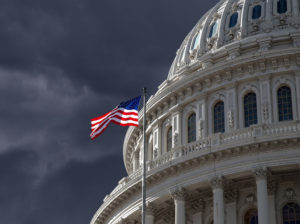Johnson Amendment Still in Danger

This week, Congress passed its major tax overhaul after numerous false starts and mistakes forced them to revote on the bill. Regardless of how humanists feel about other sections of the bill, we should be ecstatic that language in the House version that weakened the Johnson Amendment was not included in the final version.
For those who aren’t aware, the Johnson Amendment refers to a change in the US tax code made in 1954 that prohibits certain tax-exempt organizations from endorsing or opposing political candidates. The amendment affects churches and other nonprofit organizations with 501(c)(3) tax exemptions.
A repeal of the Johnson Amendment would have several important impacts on our democratic system. For example, political donations to churches, which would eventually be given to candidates or causes, would be tax-deductible, unlike other forms of political giving. Contributions to super PACs and to candidates are not tax-deductible. Additionally, with a repeal, donations to churches for political ends would be anonymous, unlike most other forms of political giving. This is especially concerning because while most 501(c)(3) groups must file a Form 990 with their tax return (which provides some information about the group and its activities), churches are exempt from that reporting requirement. As a result, their political spending would be nearly impossible to track. And, of course, if the amendment is repealed, churches and other houses of worship would be able to endorse candidates from the pulpit and tie their endorsement to a religious imperative in order to sway their parishioners. Doing so would not threaten their privileged tax status.
The provision within the tax bill would have allowed for churches and other 501(c)(3)s to endorse candidates for public office, so long as doing so was part of the ordinary course of their activities and didn’t incur additional expenses. This limited repeal is still dangerous though, as houses of worship could print endorsements of political candidates in pre-existing publications like church newsletters and other religious materials.
While we are glad that this harmful language wasn’t included in the final tax bill, it’s important to note that other bills to repeal the Johnson Amendment are still being considered.
The first of these is the Free Speech Fairness Act, which was introduced by Rep. Steve Scalise (R-LA) in the House and Senator Tom Lankford (R-OK) in the Senate, and is very similar to the language that was in the tax bill. This bill states that “an organization may not lose its tax-exempt status under section 501(c)(3) solely because of the content of any statement that: (1) is made in the ordinary course of the organization’s regular and customary activities in carrying out its exempt purpose, and (2) results in the organization incurring not more than de minimis incremental expenses.” This bill, if passed, would effectively allow churches and 501(c)(3)s to participate in campaign politics, so long as doing so wouldn’t incur new, sizeable expenses.
The second bill is H.R. 172, which only has one co-sponsor, but would repeal the Johnson Amendment in its entirety and likely force the government to come up with a new regulatory scheme to ensure that 501(c)(3)s still allocate the majority of their spending for charitable purposes.
The final bill is the Financial Services and General Government Appropriations bill, which contains a provision that weakens the Johnson Amendment by requiring consent from the IRS commissioner for each investigation into churches; notification to two committees in Congress; and a ninety-day waiting period before such investigations could commence. This bill would effectively cripple the Johnson Amendment by making the law essentially unenforceable or extremely burdensome to enforce. This bill has a real chance of becoming law with the Johnson amendment provision intact, as Congress must pass an appropriations bill soon to keep funding the government through next year.
All of this is to say that while we should be thankful that tax reform didn’t result in repeal of the Johnson Amendment, we must keep our eyes on the other pieces of legislation which would do massive damage to the amendment and the separation between church and state.
